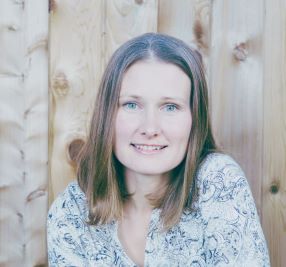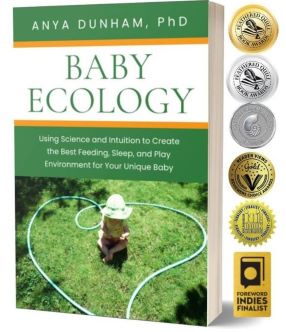Baby Ecology book is here! Learn more
Baby Ecology book is here!
- Home
- Maternal instinct myth
- Parenting techniques
- Science-based parenting approach
Science-based parenting: Finding your way
by Anya Dunham, PhD
Science-based parenting can help us avoid conflicting parenting trends — and guide us to the answers that work best for our babies and our families.
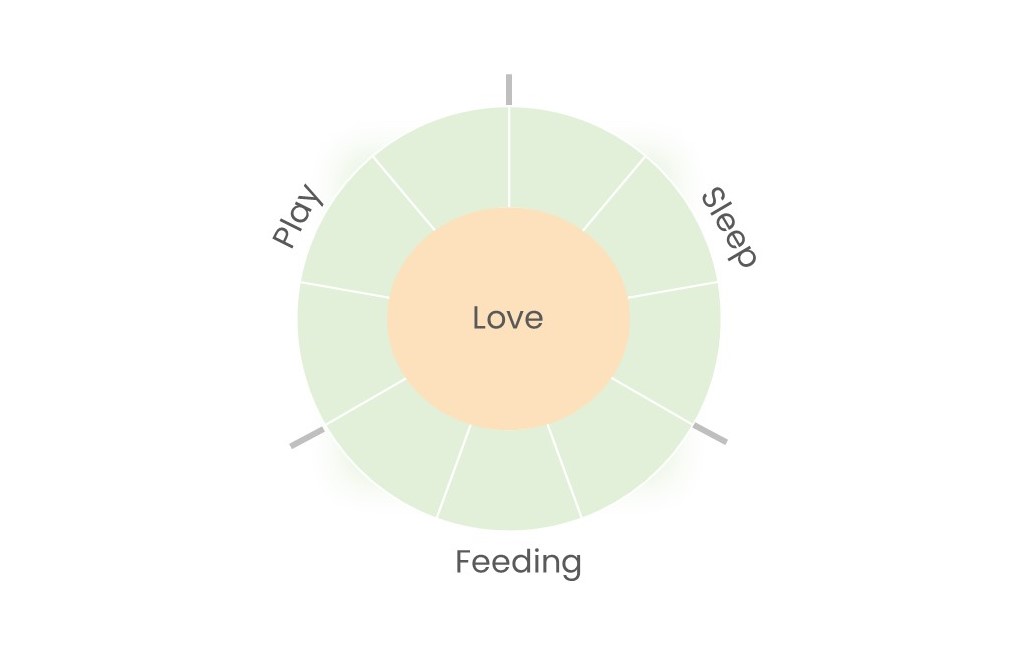
(This is an expanded version of one of the chapters of my book, Baby Ecology.)
When I think back to my first year as a mom, I remember feeling love beyond any experience I had yet had. I was swept off my feet by my fierce need to nurture and protect our baby, by her uniqueness and completeness… but also by worry and doubt. I was ready for the sleepless nights, but not for how huge the responsibility for a tiny person would feel.
I wanted to become the best parent I could be, so I read dozens of parenting books and browsed through countless online resources, soon finding myself in a sea of conflicting trends. “Babywear” but “don’t restrict free movement”, “sleep train” but “never leave your baby to cry”, “no purees, no more mush” but “start solids between 4 and 6 months”… The advice was confusing and not helpful.
The science-based parenting approach
By the time my first baby was born I had a PhD in biology and had spent 12 years doing biological research. So I went to the original sources of knowledge about babies: the peer-reviewed scientific studies. I carefully read over 800 papers on infant development, sleep, and feeding, and separated well-substantiated results from preliminary findings and speculations.
It became clear why there are so many conflicting approaches to baby care.
Science has accumulated a vast amount of knowledge on child development and the ways babies are raised around the world. But many scientific studies are designed to answer very specific questions in very specific settings. Sometimes their findings are not supposed to be applied beyond a particular group, situation, or stage of development. Other times the findings are very preliminary and cannot and should not be considered ‘calls to action’.
For example, a recent study that has found a potential biomarker of SIDS was widely shared and celebrated on social media. “Parents of babies lost to SIDS can now know it’s not their fault, despite being told it’s from blankets or belly sleeping or overheating” read one tweet that had over 60,000 likes before it was deleted. Although this is true in a way, such statement can also be dangerously misleading. It is still immensely important that anyone caring for a baby follows safe sleeping practices, such as placing babies on their backs to sleep and keeping their head and face uncovered.
(A good review of how this important study’s findings became exaggerated to the point of being misleading can be found here.)
All too often, scientific findings get misinterpreted in the media and then amplified by parenting trendsetters who take away select messages that fit their particular philosophy. They create strict parenting “dos” and “don’ts” that presume there is only one correct way. They offer parenting techniques aimed at a particular stage or challenge that often contradict what other experts promote in their own strict guidelines. Many techniques come with a sense of pressure: “Do this… or your baby will not thrive.”
Different cultures use different approaches they consider natural, and each family creates its own set of unique baby care practices. I imagine these family practices as dots; some are quite far apart and some are closer together, but none are exactly the same:
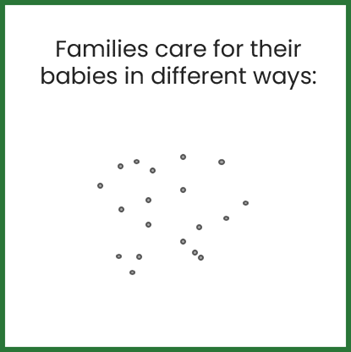
The problem is, no parenting trend works perfectly for everyone. Parents who choose to carefully follow one particular trend often discover that not all the recommended techniques work for their baby and family.
If we add parenting trends to our map of family practices, they would look like this; some work for some families, but none work for all:
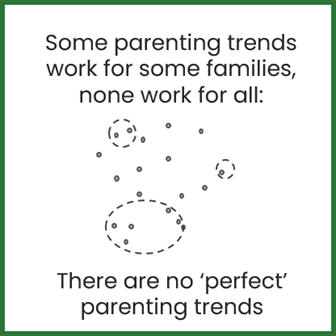
But what if we shift our perspective? What if we saw raising a baby not as a series of parenting techniques, but as an opportunity to nurture a whole person? What if we look at it from the babies’ perspective? What do babies really, truly need?
With this new frame of mind, I returned to the research, but this time went a step further. My scientific expertise is in ecology, a branch of biology that studies how living organisms relate to one another and interact with their environments. More specifically, I study habitats: spaces and environments that support life. And so I began to think about baby-care questions from an ecological perspective.
Baby ecology
Each baby has fundamental abilities and needs universal to all human babies, as well as his own unique traits. His environment consists of the physical spaces he lives in, the care he receives, and his interactions with the people in his life: everything that shapes his day-to-day experiences. In developmental psychology this immediate environment is called the microsystem.1, 2
I critically examined the scientific studies once again, but this time through the lens of ecology: baby ecology. I set out to find answers to these questions:
- What are the fundamental, universal needs of all human babies?
- What elements in babies’ environment help meet these needs?
- What circumstances make meeting these needs difficult?
After I analyzed the scientific research from this new angle, it became very clear that there will never be one perfect parenting trend or a set of 'best' parenting techniques; there is not just one “right” way to raise a baby.
However, there is a biologically optimal range that supports every baby’s unfolding natural abilities. I called this range is the Optimal Nurturing Environment, or “the ONE” for short.
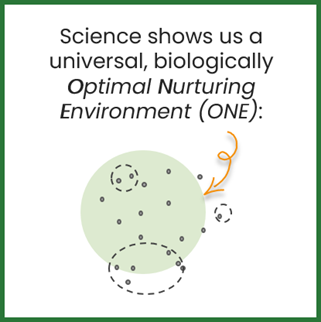
Upon first glance, this might sound like “just another parenting trend”. But please hear me out.
The ONE is based on human biology and is universal: it is the same for all human babies. To find it, we need to carefully consider and include studies that are relevant to all babies, and exclude studies that are methodologically flawed, too narrow, or too specific.
And the ONE is really quite wide when it comes to baby care.
But it’s also easy to find yourself outside its range. In the picture above, some family practices fit within the ONE, but others do not; parenting trends sometimes straddle or even fall completely outside it.
Sometimes what falls outside is major (for example, scheduled feedings for even young babies promoted by Babywise, despite science clearly showing the benefits of feeding on demand).
Other times – and thankfully I find this more common than my first example – it’s specific techniques that may fall outside the ONE, techniques that may or may not be integral to the approach itself.
RIE® and science
A philosophy that I have found immensely helpful in raising my children is RIE® (Resources for Infant Educarers). The books by RIE® founder Magda Gerber (“Dear Parent” and “Your Self-Confident baby”) and the work of Janet Lansbury and Lisa Sunbury gave me a new way of looking at babies and children for which am very, very grateful. I am happy to see that many more people know about RIE® now than 12 years ago when I first learned about it.
I often see questions whether RIE® is supported by science. (For example, this thread on Reddit.)
When I looked into the science of baby’s first year, I found much support for RIE® key principles. But sometimes RIE® is misinterpreted and presented as a set of rigid rules and techniques, like ‘no pacifiers’, ‘no high chairs’, and ‘no baby wearing’ – and I have not found solid scientific support for these specific recommendations.
To re-iterate, the true essence of RIE® is not in these recommendations; it’s in the key principles of respect and trust. At its core, RIE is a philosophy, much as parenting is probably more of an art than science (as Robin Einzig eloquently describes here). But if you, like me, are into science-based parenting, you might find it encouraging that ideas like sensitive observation, freedom to explore, and baby’s involvement in caregiving activities are very solidly backed by science. (I recently had a wonderful opportunity to discuss some of the research supporting respectful parenting with Janet Lansbury on Unruffled.)
To my knowledge, there is no research specifically on RIE® itself, but I don’t see this as a negative - it’s just not possible to study the effects of a whole parenting philosophy, because there are so many variables in how individual families apply it and so much variability in family circumstances. It’s possible to isolate the effects of individual recommendations… but as I said above, I believe at its core RIE is not about the specifics and techniques.
I believe the science-based parenting approach, and the ONE approach, can be applied to the whole-picture questions like the spaces and experiences we create for our babies; big questions like baby sleep; and smaller, specific questions, like screen time.
Your ONE is at the intersection of best available science and your individual, unique baby’s needs and your family’s values and circumstances.
I hope you feel empowered and supported in finding it.
Baby Ecology book
What is at the heart of all decisions you make for your baby? I think I know the answer: love. Love is the foundation.
Building up from love, my award-winning book Baby Ecology describes 10 universal elements of a nurturing environment, in each of the major aspects of raising babies: sleep, feeding, and care and play. These elements are important, and possible, for all families to create, regardless of cultural backgrounds or parenting philosophies and the specific care practices they choose. They matter for all babies. They are the building blocks that we place on the foundation of love to create a nurturing environment, a strong base for baby to grow.
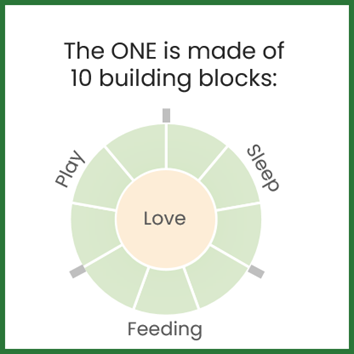
We, parents and caregivers, have the extraordinary power to create and protect our baby’s environment, especially in the first year. Each baby’s development is a result of a dynamic interplay between nature and nurture. If we make thoughtful and intentional choices, we can nurture with nature as opposed to working against it. A wholesome, balanced environment gives babies the support and freedom to explore, connect, and express who they are and what they need. Such an environment has effects that can last a lifetime. It helps biological rhythms emerge and natural development unfold. It supports babies in growing at their own pace and developing their full potential, being the people they are meant to be.
In contrast, when important elements are missing or out of balance, it makes it harder to see who our babies truly are and more difficult to interpret what they are telling us. For example, a baby who has high sleep needs but is chronically tired may appear unsettled and very active, making you think he no longer needs daytime naps; a baby who’s been offered solid foods before she was ready may seem like a picky eater. Missing these elements makes it difficult for us to connect with our babies and creates and reinforces patterns that can be hard to change later on.
Sometimes expecting parents plan to rely solely on their instincts. But parenting skills and knowledge don’t show up magically once our babies are born. When you become a parent you will feel the power of the caregiving drive. This drive will inspire a fierce desire to protect and nurture your baby — but you won’t naturally know how to translate this desire into action, and that’s okay. You need the time and space to learn. Two resources you can draw from are scientific knowledge and your intuition. Science can help you with both: it will give you the evidence and a way to separate true intuitive knowledge from biases and fads. The ONE approach will help you use the scientific knowledge and your intuition as you care for your baby in ways that match your values and your baby’s unique personality, creating a strong nurturing foundation.
There are many, many ways to create your unique family practices within the ONE. Baby Ecology was written to help you find your way.

References
References
1. Bronfenbrenner U (1979) The ecology of human development. Harward University Press, Harward, MA, USA
2. Bronfenbrenner U (1992) Ecological systems theory. Pp. 187-249 in: Six theories of child development: revised formulations and current issues (ed. R. Vasta). Jessica Kingsley Publishers, London, England


